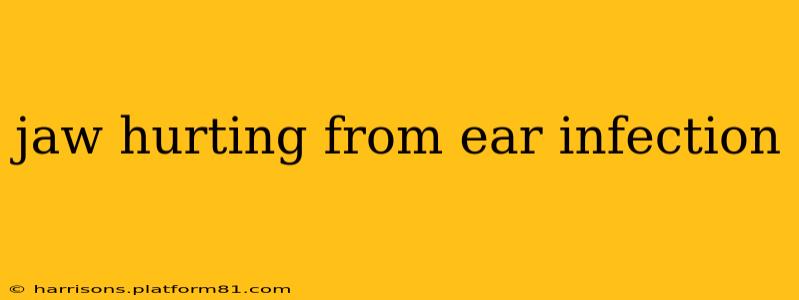Ear infections, while commonly associated with earache, can sometimes cause pain that radiates to the jaw. This isn't unusual, as the structures within the ear, jaw, and face are closely interconnected. Understanding this connection is crucial for effective management of the pain. This article explores the link between ear infections and jaw pain, providing insights into why it occurs and what you can do to alleviate discomfort.
Why Does My Ear Infection Hurt My Jaw?
The pain radiating from your ear to your jaw isn't a direct result of the infection itself traveling to your jaw. Instead, it's due to the intricate network of nerves in this area. The trigeminal nerve, responsible for sensation in the face and jaw, is closely intertwined with the nerves supplying the ear. When the ear is inflamed and irritated due to an infection, this irritation can trigger pain signals along these shared nerve pathways, leading to jaw pain. Think of it like a traffic jam – the pain signal gets redirected along the readily available nerve pathways.
Can an Ear Infection Cause Jaw Pain and Swelling?
Yes, while pain is the more common symptom, swelling in the jaw area is also possible, albeit less frequent. This swelling is usually a result of the inflammatory process associated with the ear infection. The inflammation can spread to nearby tissues, including those in the jaw, causing some degree of swelling. However, if you experience significant swelling alongside the jaw pain, it’s crucial to seek medical attention promptly to rule out other potential underlying conditions.
How Long Does Jaw Pain from an Ear Infection Last?
The duration of jaw pain associated with an ear infection varies depending on the severity of the infection and the individual's response to treatment. Typically, the pain should subside as the ear infection clears up. If the ear infection is treated effectively with antibiotics or other appropriate medical interventions (as determined by a physician), the associated jaw pain usually diminishes within a few days to a week. However, if the pain persists or worsens, it's crucial to consult a healthcare professional to rule out other causes.
What Can I Do to Relieve Jaw Pain from an Ear Infection?
While addressing the underlying ear infection is key, several measures can help alleviate the accompanying jaw pain:
- Over-the-counter pain relievers: Nonsteroidal anti-inflammatory drugs (NSAIDs) like ibuprofen or naproxen can help reduce both pain and inflammation. Always follow the dosage instructions carefully.
- Warm compresses: Applying a warm compress to the affected ear can help soothe the inflammation and provide comfort.
- Gentle jaw massage: Gently massaging your jaw muscles can help relax them and reduce tension, potentially easing the pain.
- Rest: Getting adequate rest is crucial for your body to fight the infection and recover.
- Avoid chewing hard foods: This can exacerbate the jaw pain. Opt for softer foods that are easier to chew.
Important Note: These are temporary measures to relieve discomfort. They do not treat the underlying ear infection.
When Should I See a Doctor About Jaw Pain from an Ear Infection?
It's crucial to consult a doctor if:
- The jaw pain is severe or doesn't improve with over-the-counter pain relievers.
- You experience significant swelling in the jaw area.
- You have a high fever.
- The pain lasts longer than a week.
- You experience other symptoms such as difficulty hearing, dizziness, or facial weakness.
A healthcare professional can properly diagnose the ear infection and recommend the appropriate treatment, ultimately resolving both the ear infection and the associated jaw pain. Early intervention is key to prevent complications.
Is Jaw Pain a Sign of a Serious Ear Infection?
While jaw pain associated with an ear infection is usually a symptom of a relatively common problem, it's important not to dismiss it. Persistent or severe pain, accompanied by other symptoms mentioned above, could indicate a more serious infection requiring prompt medical attention. It's always best to err on the side of caution and seek medical advice if you have concerns. The information provided here is for general knowledge and should not be considered a substitute for professional medical advice. Always consult a doctor for diagnosis and treatment.
